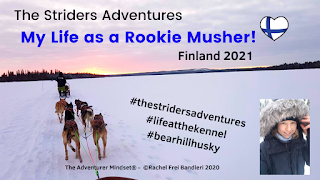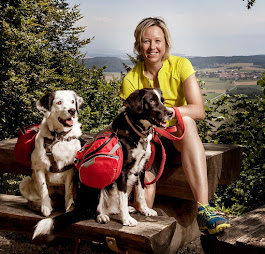 |
| The Arctic Anthropology Team |
I am running behind schedule regarding all the topics I planned to write before my departure. Oh well, it leaves me with plenty of things to tell you on my return! But there is one thing I absolutely want to do before hitting the road: presenting The Arctic Anthropology team from the Arctic Centre and their work.
As you know, "Hiking for the Arctic" is a mean to raise awareness on climate changes, on how people and animals adapt to these ongoing alterations, and on solutions implemented by locals and research teams. The Arctic Anthropology team is made of people passionate about the Arctic and their specific field of research. The various projects they work or have worked on truly deserve to be better known and supported by a larger audience. If through my blog and my action I can contribute to making their research widely known, then I'd have reached my goal!
All the information provided below comes from the website, the blog and other documents from the Arctic Anthropology team. For those interested and for more extensive information, I strongly encouraged you to visit their pages .
Research Projects
run by the anthropology group or with a strong role
of their members
Ongoing projects
People living in the Arctic have had decisions made for them, far away in Southern in capital cities, be it in Russia, Finland or any other Northern country. This project would like to take a bottom-up approach to the writing and reading of the histories of the people of the North, and how their lives developed in the 20th Century. |
|
ACCESS
Anna Stammler-Gossmann is coordinating the socio-economic impact assessment of climate change on the fishery sector in the Barents region and activities of the Board of Ethical Issues within EU FP 7 project ACCESS (Arctic Climate Change Economy and Society). The ACCESS project was selected in response to the first call ‘The Ocean of Tomorrow’ of the European Union. The European Commission supported the Arctic Centre research with 359,094.94 Euros. ACCESS will evaluate the impacts of climate change on economic sectors such as fishery, oil and gas extraction, marine transportation and analysis of associated risks. |
|
RISES
RISES will reconstruct the environmental histories of integrated social-ecological systems in Fennoscandia and Yamal, West Siberia that have been characterized by both climate change and the constant adaptation of people and their reindeer herds through the late Holocene. The team is experienced in strongly interdisciplinary and theoretical research. Intensive study areas for collecting experimental (quantitative) and descriptive (qualitative) data are selected for two bioclimatic zones, near and beyond treeline, in each region.
New project
Arctic Ark: new project on animal breeds, species and human practices in the Arctic
Human-animal
adaptations to the Arctic environment: natural and folk selection practices
|
Past projects
In depth study of relocation history, senses of
place, and community-dynamics in Russian northern industrial cities, with case
studies in Murmansk Oblast and West Siberia. INNOCOM is part of the MOVE project
(IPY # 436), under the ESF Eucoroes BOREAS programme, where they look
at state-induced population movements in the circumpolar North in general. The
project is funded by Finnish Academy until 2010. Researchers involved from
the anthropology team are Florian Stammler (PI), and Alla Bolotova (phD
candidate).¨
A mega
natural science project (IPY endorsed) financed by the EU looking at
climate change in the Arctic, in particular the Arctic Ocean. The social
part of Damocles is tiny in comparison to the natural sciences, but
Anna Stammler-Gossmann looks at coastal fishing in Russia, both fishing
industry and fishing
A project
(IPY # 157) that takes the community level as basic unit to
analyse vulnerability and adaptation to climate and other global change,
financed by Finnish Academy. They follow the ’multiple-stressor’ principle
that considers the simultaneity of several drivers of change in their
intertwined impacts on communities. Anna Stammler-Gossmann studies in this
project fishing communities in Murmansk and Nenets Autonomous Okrug of Russia,
and Terhi Vuolaja-Magga does an in depth study of Finnish and Saami communities
in northern Lapland (Ivalo, Inari, Kuttura).
An
interdisciplinary project where biologists and anthropologists take reindeer
pastures as the primary unit of analysis to look at the impact of change,
financed by Thule Institute. Of particular interest to the
biologists is the increase in UV radiation, and how reindeer and vegetation
react to it. Terhi Vulaja-Magga analyses in this project reindeer herders’
perceptions of changes on their pastures, and their possible responses to these
changes. This feeds in to answering the question of what are the main factors
that make reindeer and pastures vulnerable, and how can a partnership between
academia and herders contribute to better responding to these challenges.
In
Ensinor they assessed the social and environmental impact of oil&gas
development in Russia’s fastest expanding oil extraction region, the Nenets
Autonomous Okrug, and in Russia’s biggest gas extraction region, the
Yamal-Nenets Autonomous Okrug. Financed by Finnish Academy, the project
undertook intensive fieldwork 2004-2007 in both regions, worked together with
reindeer herders, municipalities and the industry to achieve a balanced
analysis from all sides. The overall project was coordinated by Bruce Forbes.
Florian Stammler coordinated the anthropology part and project implementation
in Russia. One of the results was that there is quite a good basis of friendly
relationships between herders and industrial workers on the ground. But
problems arise on higher levels, where decisions are often made without
considering everybody’s interest. The project ended in 2007 with a symmposium
in Rovaniemi, but outreach activities are ongoing, as oil and gas impact
assessment are one of the most important current topics in the Arctic.
See also the ’news and events’ section of our anthropology
website
This project investigates from a theoretical perspective the processes
of production of space and its relationship with power within the Sámi context.
The aim of the project is to contribute to general debates on issues of power
and space as brought forward by Foulcault, Lefebvre and others,
particularly with reference to those cases where relationships of power and
space determine conflictuous situations. Analysing these situations helps
them to understand the dynamics in which entitlements, time and identities
are being reconfigured.
Presenting the Arctic Anthropology team from the Arctic Centre in Rovaniemi
 Reviewed by Rachel FB - The Striders
on
July 31, 2015
Rating:
Reviewed by Rachel FB - The Striders
on
July 31, 2015
Rating:
 Reviewed by Rachel FB - The Striders
on
July 31, 2015
Rating:
Reviewed by Rachel FB - The Striders
on
July 31, 2015
Rating:











No comments: